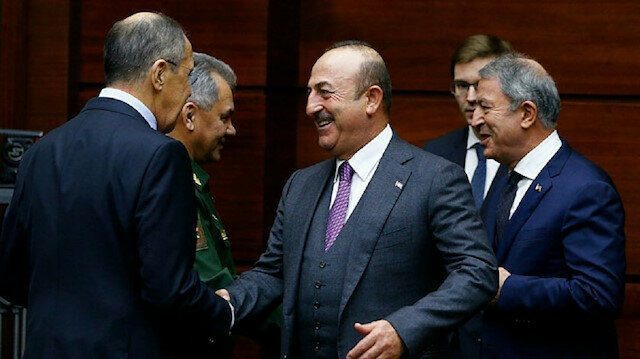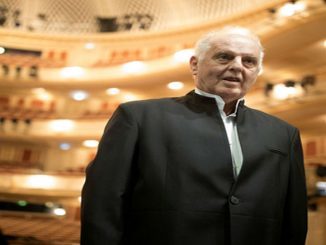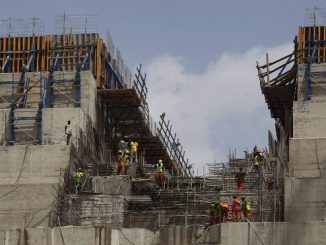
EU ready to support Berlin process for Libya peace, says top EU officials
The European Union’s foreign policy chief and the head of bloc’s parliament Monday welcomed the cease-fire in Libya.
“The announcement of a ceasefire in Libya provides an important opportunity to resume dialogue for a political solution to the crisis. It is now to the parties to fully implement it,” said Josep Borell, high representative of the EU for foreign affairs and security policy, on Twitter.
“The EU is ready to help Berlin process and efforts of UN. All Libyans deserve peace and prosperity,” he added.
Separately, David Sassoli, the president of the European Parliament, welcomed the decision in a written statement.
“The halt to the armed conflict is the first fundamental step in the right direction. This is a result for which the European Union has worked hard for,” said he in the statement.
“It is now necessary to consolidate this result and relaunch, after months of stalemate, the dialogue between the parties to find a political solution to the Libyan crisis,” he said.
“The European Union, under the auspices of the United Nations and within the framework of the Berlin Process, can and must play a leading role in facilitating this,” he added.
Since last September, several high-level meetings were held in Berlin to put an end to the Libyan conflict.
The meetings were held with the participation of France, Italy, Germany, and the U.K. The negotiations are known as the Berlin peace process.
On Jan. 12, the warring sides of the Libyan conflict announced a cease-fire in response to the call of Russian and Turkish presidents.
The cease-fire took effect at midnight local time (2200GMT) and the decision was celebrated with fireworks in Tripoli.
Cease-fire takes hold in Libya’s Tripoli amid talks
A cease-fire called by Turkey and Russia took hold for the second day in the Libyan capital Tripoli on Monday amid talks between warring rivals in Moscow.
The cease-fire came into force on Sunday amid accusations by both sides of violating the agreement.
The UN-recognized government said a civilian was killed by forces loyal to renegade commander Khalifa Haftar south-east of Tripoli. Gunfire was also reported in Salahuddin district in the Libyan capital.
“Our forces are fully committed to the cease-fire, but are on alert on respond to any breach by Haftar’s forces,” a commander of the UN-recognized government’s forces told Anadolu Agency.
On Monday, Fayez al-Sarraj, the head of the internationally recognized government, and Haftar, who is based in eastern Libya, arrived in Moscow for talks aimed at resolving the Libyan crisis.
Critical Libya ceasefire meeting in Moscow
A critical meeting chaired by Turkish Foreign Minister Mevlüt Çavuşoğlu and his Russian counterpart Sergey Lavrov to officially sign a ceasefire agreement between the main actors in Libya has kicked off in the Russian capital on Monday.
In attendance were Turkish National Defense Minister Hulusi Akar and his Russian counterpart Sergey Shoygu.
UN-recognized Libyan Prime Minister Fayez al-Sarraj and Eastern Libya Commander General Khalifa Haftar have also arrived in Moscow to take part in the talks.
Libya cease-fire to prevent bloodshed, says Al-Sarraj
The head of Libya’s UN-recognized government, Fayez al-Sarraj, said Monday his government has accepted the cease-fire deal with renegade commander Khalifa Haftar to prevent more bloodshed in the country.
“We will not ignore the sacrifices of our sons and martyrs or our dream for a civil state,” al-Sarraj said in an interview with the private Alahrar TV channel.
“Our acceptance of the cease-fire comes from a position of strength to maintain national and social cohesion,” he said.
Al-Sarraj said his government forces, however, are ready “to resume military operations in case of any break to the cease-fire”.
The cease-fire called by Turkey and Russia came into force on Sunday, with the agreement celebrated in Tripoli with fireworks.
In April, Haftar launched an offensive to capture Tripoli from the UN-recognized government.
According to the UN, more than 1,000 people have been killed since the start of the operation and more than 5,000 others injured.
Since the ouster of late leader Muammar Gaddafi in 2011, two seats of power have emerged in Libya: one in eastern Libya supported mainly by Egypt and the United Arab Emirates and the other in Tripoli, which enjoys the UN and international recognition.
On April 4, Haftar launched an offensive to capture Tripoli from the GNA. According to the UN, more than 1,000 people have been killed since the start of the operation and more than 5,000 others injured.



